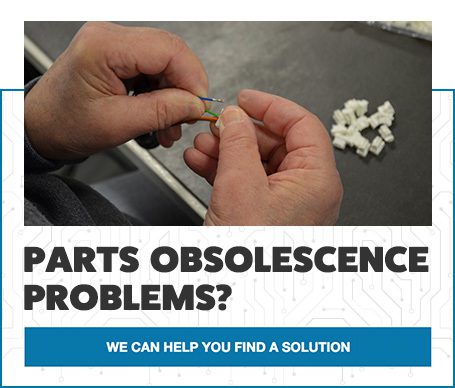Winning the Long Game in Defense Tech with Smart Obsolescence Planning
Defense technology manufacturers face constant challenges from rapidly changing technologies and supply chain disruptions. To win the long game in defense tech, you need smart obsolescence planning. This means working with a domestic, turnkey ECM who understands the importance of anticipating risks, leveraging engineering expertise to extend legacy systems through reverse engineering, sourcing components proactively to avoid component shortages, and providing support when needed.

The First Step in Obsolescence Planning is Anticipation
Obsolescence planning is important for electronic manufacturing success in defense technology. Anticipating potential obsolescence is the first step to success. Understanding the lifecycle and critical components of each system and recognizing how technological advancements can render today’s products obsolete tomorrow is something that a quality ECM should have as a focus. Designers and manufacturers who invest in lifecycle forecasting tools and robust methodologies are better equipped to predict and monitor potential risks.
This proactive approach means working closely with vetted suppliers to track technological changes and supply chain developments, enabling rapid response to emerging challenges. A comprehensive obsolescence management plan should include dedicated teams that continuously monitor and identify issues before they disrupt operations. By anticipating problems, organizations can cultivate supply chain resilience, minimize downtime, and control costs, all while keeping mission-critical systems reliable and compliant with defense standards. Ultimately, a disciplined strategy of obsolescence planning empowers defense contractors to extend the operational lifespan of legacy systems and adapt to evolving market conditions. In the face of persistent and often unpredictable obsolescence challenges, it is anticipation that sets leaders apart.

Engineers Help Defense Contractors Extend the Life of Legacy Systems
Not every ECM has a team of on-site engineers working on manufacturing processes daily. In some facilities, the engineering team is called in only when an issue arises that needs immediate attention. However, engineers at an electronic contract manufacturer play an important role in extending the operational life of defense legacy systems by employing their specialized expertise in lifecycle forecasting, reverse engineering, and component substitution. Their deep understanding of system architecture and critical components allows them to not only react to obsolescence issues, but proactively address technical challenges before they impact production.
By leveraging advanced forecasting tools and collaborating closely with vetted suppliers, engineers can identify compatible and compliant replacements for discontinued or obsolete parts. Their skill in reverse engineering enables the precise analysis and recreation of legacy components, maintaining strict adherence to defense standards and system reliability. These efforts will not only mitigate supply chain vulnerabilities but also foster new innovations, allowing defense platforms to evolve along with technological advances. Ultimately, engineers are instrumental in safeguarding manufacturing continuity, minimizing downtime, and reducing costs so that defense products are not negatively impacted by obsolescence.
Proactive Sourcing to Have What You Need When You Need It
Proactive component sourcing is a critical strategy in defense technology. It allows essential systems to remain operational in the face of rapid technological change and unpredictable supply chain disruptions. By establishing robust relationships with vetted suppliers, ECMs gain access to reliable sources for both current and legacy components, minimizing the risk of obsolescence.
These trusted partnerships make it possible to anticipate shortages, quickly adapt to market fluctuations, and secure hard-to-find parts before they become unavailable. Through diligent supplier evaluation and ongoing collaboration, ECMs can verify quality, compliance, and the ability to meet stringent defense standards. This not only reduces downtime and costly delays but also strengthens overall supply chain resilience. By prioritizing vetted suppliers and strategic sourcing, we safeguard mission-critical systems, foster innovation, and maintain operational continuity.
Reverse Engineering for Component Substitution
One of the most valuable assets a defense contractor can have is an engineering team skilled in reverse engineering, particularly when handling component substitution for legacy systems. As original components become obsolete or unavailable due to supply chain disruptions or discontinued manufacturing lines, reverse engineering enables experts to deconstruct existing parts and analyze their design, materials, and performance specifications. This process allows the engineering team to identify or develop compatible substitutes that integrate seamlessly into the overall system without compromising reliability or compliance. By carefully validating and testing each alternative, Levison addresses compatibility issues, mitigates risks, and maintains strict adherence to defense standards. This approach not only extends the operational lifespan of critical systems but also eliminates costs associated with sourcing rare or outdated parts. Ultimately, possessing this internal capability allows us to adapt swiftly to changing market conditions and technological advancements, even in the face of persistent obsolescence challenges.
Meeting Defense Standards is Key
Choosing a domestic, turnkey ECM for defense electronic manufacturing offers unmatched benefits in reliability, security, and compliance with the most up-to-date regulations. Levison Enterprises is well-versed in strict defense standards and regulatory requirements for field-ready devices. As a turnkey shop, we have the ability to manage every aspect of production, from design through delivery, resulting in fewer issues and faster turnaround times. This turnkey approach reduces risks associated with offshore manufacturing, such as supply chain disruptions and intellectual property vulnerabilities. By partnering with us, you not only gain superior quality, but also prompt support and reliability.
By leveraging a domestic, turnkey ECM with proven defense expertise, you can count on greater security, faster response times, and exceptional compliance with all regulatory requirements. Having a proactive obsolescence management plan is critical for defense tech, and the right ECM can make the difference between a smooth manufacturing process and one at risk of delays and component shortages.
Winning the long game in defense tech requires more than reacting to supply chain disruptions. It takes foresight, engineering expertise, and a partner who understands the stakes. With smart obsolescence planning, you protect legacy systems, reduce downtime, and keep mission-critical projects moving forward without compromise. By choosing a domestic, turnkey ECM like Levison Enterprises, you gain a team that anticipates challenges, delivers compliant solutions, and safeguards your manufacturing process from costly delays. In an industry where reliability and readiness cannot be negotiated, the right obsolescence strategy is not just a safeguard but a competitive advantage. Contact us for a quote today.
Start Your Quote Now!